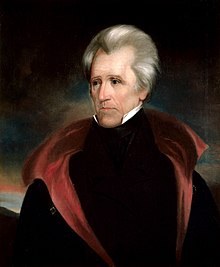General Andrew Jackson
| Andrew Jackson | |
|---|---|

Portrait by Ralph Eleaser Whiteside Earl, c. 1837
|
|
| 7th President of the United States | |
|
In office March 4, 1829 – March 4, 1837 |
|
| Vice President |
John C. Calhoun (1829–1832) None (1832–1833) Martin Van Buren (1833–1837) |
| Preceded by | John Quincy Adams |
| Succeeded by | Martin Van Buren |
|
United States Senator from Tennessee |
|
|
In office March 4, 1823 – October 14, 1825 |
|
| Preceded by | John Williams |
| Succeeded by | Hugh Lawson White |
|
In office September 26, 1797 – April 1, 1798 |
|
| Preceded by | William Cocke |
| Succeeded by | Daniel Smith |
| Military Governor of Florida | |
|
In office March 10, 1821 – December 31, 1821 |
|
| Appointed by | James Monroe |
| Preceded by | José María Coppinger (Spanish East Florida) |
| Succeeded by | William Pope Duval |
| Member of the U.S. House of Representatives from Tennessee's at-large district |
|
|
In office December 4, 1796 – September 26, 1797 |
|
| Preceded by | Constituency established |
| Succeeded by | William C. C. Claiborne |
| Personal details | |
| Born |
March 15, 1767 Waxhaw Settlement between the Provinces of North Carolina and South Carolina, British America |
| Died | June 8, 1845 (aged 78) Nashville, Tennessee, U.S. |
| Resting place | The Hermitage |
| Nationality | American |
| Political party |
|
| Spouse(s) | Rachel Donelson (m. 1794; d. 1828) |
| Children | 3 adopted sons |
| Parents |
|
| Signature | |
| Military service | |
| Allegiance |
|
| Service/branch |
|
| Rank |
|
| Battles/wars | |
| Awards | |
| The Jackson Cabinet | ||
|---|---|---|
| Office | Name | Term |
| President | Andrew Jackson | 1829–1837 |
| Vice President | John C. Calhoun | 1829–1832 |
| None | 1832–1833 | |
| Martin Van Buren | 1833–1837 | |
| Secretary of State | Martin Van Buren | 1829–1831 |
| Edward Livingston | 1831–1833 | |
| Louis McLane | 1833–1834 | |
| John Forsyth | 1834–1837 | |
| Secretary of Treasury | Samuel D. Ingham | 1829–1831 |
| Louis McLane | 1831–1833 | |
| William J. Duane | 1833 | |
| Roger B. Taney | 1833–1834 | |
| Levi Woodbury | 1834–1837 | |
| Secretary of War | John H. Eaton | 1829–1831 |
| Lewis Cass | 1831–1836 | |
| Attorney General | John M. Berrien | 1829–1831 |
| Roger B. Taney | 1831–1833 | |
| Benjamin Franklin Butler | 1833–1837 | |
| Postmaster General | William T. Barry | 1829–1835 |
| Amos Kendall | 1835–1837 | |
| Secretary of the Navy | John Branch | 1829–1831 |
| Levi Woodbury | 1831–1834 | |
| Mahlon Dickerson | 1834–1837 | |
Andrew Jackson (March 15, 1767 – June 8, 1845) was an American soldier and statesman who served as the seventh President of the United States from 1829 to 1837. Before being elected to the presidency, Jackson gained fame as a general in the United States Army and served in both houses of Congress. As president, Jackson sought to advance the rights of the "common man" against a "corrupt aristocracy" and to preserve the Union.
Born in the colonial Carolinas to a Scotch-Irish family in the decade before the American Revolutionary War, Jackson became a frontier lawyer and married Rachel Donelson Robards. He served briefly in the U.S. House of Representatives and the U.S. Senate representing Tennessee. After resigning, he served as a justice on the Tennessee Supreme Court from 1798 until 1804. Jackson purchased a property later known as the Hermitage, and became a wealthy, slaveowning planter. In 1801, he was appointed colonel of the Tennessee militia and was elected its commander the following year. He led troops during the Creek War of 1813–1814, winning the Battle of Horseshoe Bend. The subsequent Treaty of Fort Jackson required the Creek surrender of vast lands in present-day Alabama and Georgia. In the concurrent war against the British, Jackson's victory in 1815 at the Battle of New Orleans made him a national hero. Jackson then led U.S. forces in the First Seminole War, which caused the annexation of Florida from Spain. Jackson briefly served as Florida's first territorial governor before returning to the Senate. He ran for president in 1824, winning a plurality of the popular and electoral vote. As no candidate won an electoral majority, the House of Representatives elected John Quincy Adams in a contingent election. In reaction to the alleged "corrupt bargain" between Adams and Henry Clay and the ambitious agenda of President Adams, Jackson's supporters founded the Democratic Party.
...
Wikipedia
